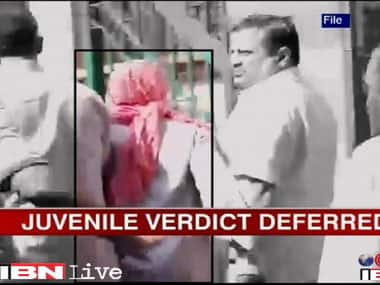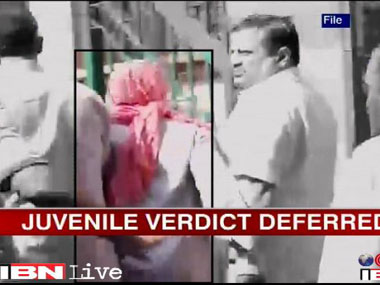New Delhi: The Supreme Court on Thursday allowed the Juvenile Justice Board (JJB) to deliver its verdict in the 16 December gangrape-cum-murder case involving a minor. The apex court, however, admitted a plea seeking fresh interpretation of the term ‘juvenile’ in the statute on the basis of mental and intellectual maturity of minor offenders instead of the age limit of 18 years while fixing their culpability. [caption id=“attachment_1052499” align=“alignleft” width=“380”]  The verdict is now likely to be pronounced on 31 August.[/caption] A bench headed by Chief Justice P Sathasivam agreed to hear BJP leader Subramanian Swamy’s plea seeking fresh interpretation of the term ‘juvenile’ but said the JJB can go ahead with pronouncing the verdict in the case. The bench also issued notice to the Centre on Swamy’s plea. Earlier, the apex court had said that the JJB be informed not to pronounce its verdict involving the juvenile, who was one of six people who had allegedly brutally gangraped a 23-year-old girl in a moving bus, till it decides the PIL. The girl died in a Singapore hospital on 29 December. On 19 August, the JJB, presided over by Principal Magistrate Geetanjali Goel, had postponed till 31 August the verdict for the fourth time since 11 July on the ground that a PIL had been filed in the Supreme Court. The inquiry against the juvenile in the gangrape and robbery case had concluded on 5 July. While the verdict in the gangrape-cum-murder case is yet to be pronounced, he has already been held guilty of robbing a carpenter who had boarded the bus the same night. The sentence, however, is yet to be awarded. The apex court had on 14 August reserved its order on the maintainability of Swamy’s plea that the Juvenile Justice Act provides for a “straitjacket” interpretation of the term ‘juvenile’ as a person below the age of 18 years and that it was in violation of the United Nations Convention for the Rights of the Child (UNCRC) and Beijing Rules on the issue. The UNCRC and Beijing Rules say the presumption of “the age of criminal responsibility” be fixed while “bearing in mind the mental and intellectual maturity” of the offender, he has said. Additional Solicitor General Siddharth Luthra while appearing for the Centre, had opposed Swamy’s plea and questioned its maintainability on the ground that a third party has no legal authority to intervene. Swamy had, however, clarified that his petition was not “individual-centric” and the reference to the juvenile accused in the 16 December gangrape case, in his plea, was merely an illustration. Besides the juvenile, four other accused in the gangrape case are Mukesh, Pawan Gupta, Vinay Sharma and Akshay Thakur and they are facing trial before a fast track court. Proceedings against key accused Ram Singh abated after his death on 11 March when he was found hanging in his cell in Delhi’s Tihar Jail. The police has in its charge sheet said the juvenile was the most brutal of all the accused. A native of Uttar Pradesh, the minor had moved to Delhi at the age of 11. He has been convicted for robbing a carpenter, Ramadhar, with the adult co-accused by luring him into the same bus in which the girl was gangraped and assaulted. He has been held guilty under section 395 (dacoity), 342 (wrongful confinement) and 412 (dishonestly receiving property stolen in the commission of a dacoity) of the IPC. He, however, was acquitted under section 365 (kidnapping or abducting with intent secretly and wrongfully to confine person) and 394 (voluntarily causing hurt in committing robbery) of the IPC. PTI
The Supreme Court on Thursday allowed the Juvenile Justice Board (JJB) to deliver its verdict in the 16 December gangrape-cum-murder case involving a minor.
Advertisement
End of Article
Written by FP Archives
see more


)

)
)
)
)
)
)
)
)



